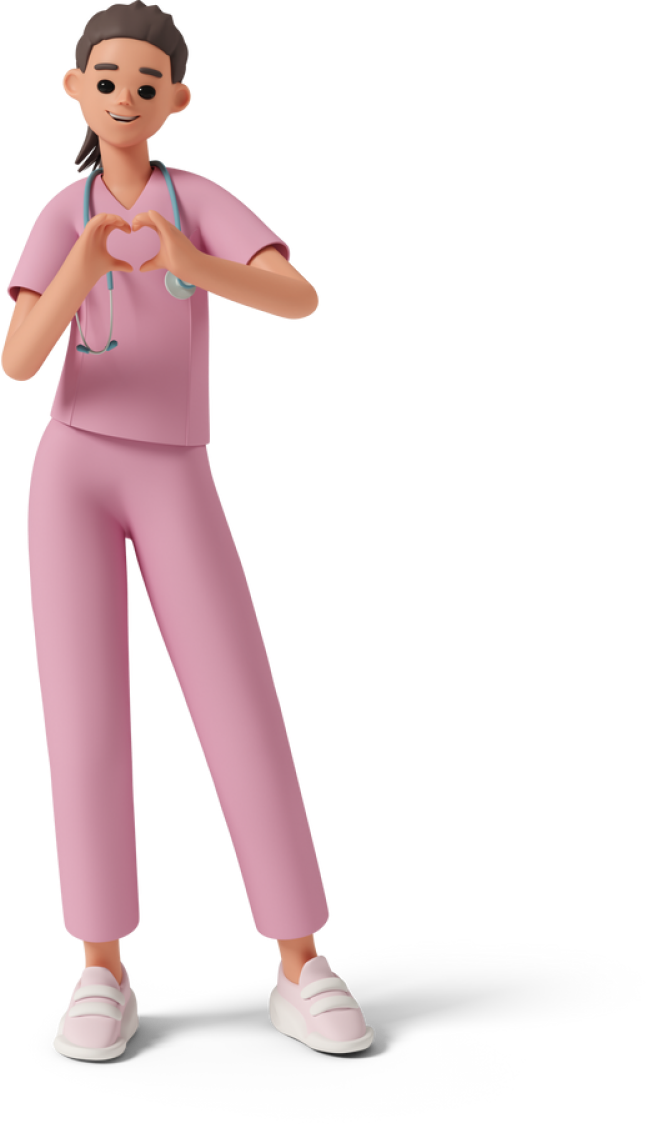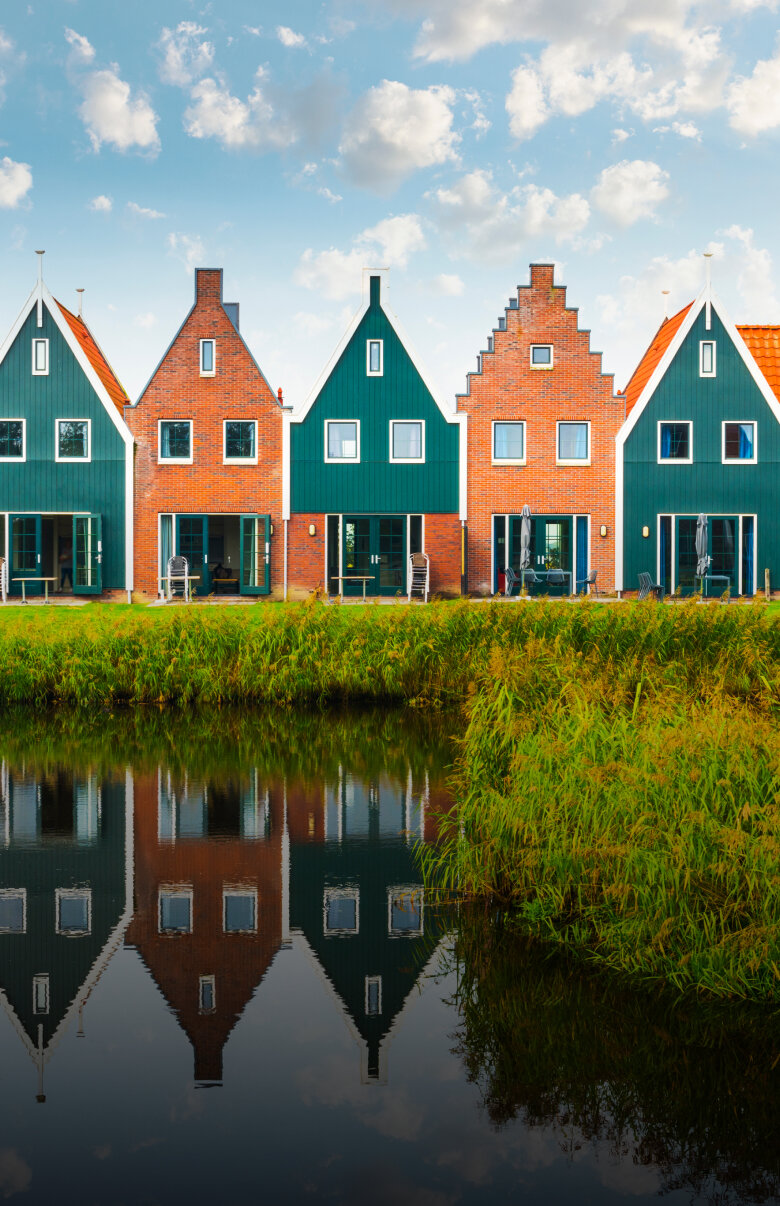UNIVERSITIES
Studying MBBS in the Netherlands

Getting a place to study medicine can be a major challenge, especially in Germany. To increase your chances, it's worth taking a look at other European countries - especially our neighbour, the Netherlands. The universities there attract students with English programmes and low tuition fees - and have even more to offer!
Are you interested in studying medicine in the Netherlands?
We would be happy to advise you free of charge about your options for studying medicine in the Netherlands.
Studying medicine in the Netherlands - The advantages
Once you have decided to study outside of Germany, there are numerous universities to choose from. We have summarised the special features of studying medicine in the Netherlands for you here:
Study in English possible
At three universities in the Netherlands, it is possible to study medicine in English. The others teach in Dutch. However, as Dutch is similar to German, you have a good chance of learning Dutch quickly. There are numerous preparatory courses for this.
Modern healthcare system and high-quality training
The medical universities in the Netherlands are particularly notable for their high-quality education. The medical programmes are very well structured and offer state-of-the-art learning methods and innovative research opportunities. There is a strong focus on practical training.
The Netherlands is known for its advanced healthcare system. During your medical studies, you will gain in-depth insights and learn about the latest medical practices in patient care.
International recognition of the degree
Although medical studies in the Netherlands are very different from German studies, they are recognised in Germany and other EU countries in accordance with the Professional Recognition Directive.
Due to the differences, it is difficult to transfer to Germany during your studies, but you have the opportunity to complete parts of your studies in Germany in the form of a semester abroad or an internship.
Fascinating landscape and lively student cities
The student cities in the Netherlands have a vibrant international community. Numerous clubs and societies offer a wide range of activities and social programmes. In your free time, you can get to know the cultural richness of the cities, as numerous museums, galleries and concerts invite you to visit.
There is also plenty to experience outside the cities. Whether it's a trip to the beach, a hike in the Wadden Sea or a cycle tour through the tulip fields in spring - there are countless ways to enjoy the beautiful Dutch countryside in your free time.

Together for success - futureMBBS and studying medicine abroad
Do you want to study medicine abroad and are looking for the most suitable university for you and don't really know where to start looking for the right country and a good university? futuredoctor is happy to support you!
Besides the Student advisory service In addition to selecting the university and accompanying you to the desired on-site appointments, futureMBBS also offers support during the application process and preparation for possible aptitude tests, as well as orientation at the place of study - including the search for accommodation! Get your application quickly and easily free info pack!
Studying MBBS in the Netherlands - At which universities can you study medicine?
There are a large number of universities in the Netherlands, but not all of them allow you to study in English. You can find more information about studying medicine at the individual universities here:
Rijksuniversiteit Groningen
Rijksuniversiteit in Groningen offers a medical degree programme in English or Dutch. Approximately 400 new places in human medicine and 50 new places in dentistry will be offered in the winter semester. Medical studies at the University of Groningen are based on the concept of "problem-based learning" and are very student-centred.
Groeningen is a popular and lively student city. You can quickly make friends in the international community. The city is compact, so you can easily explore the cultural offerings and the beautiful countryside around Groeningen on foot or by bike.
Maastricht University
The medical degree programme at Maastricht University begins in the winter semester. Lessons are taught in English or Dutch.
The degree programme is very practice-oriented and you will have contact with patients from the first semester. The teaching here is also based on "problem-based learning", which encourages active learning and critical thinking. Thanks to numerous collaborations with other universities and hospitals, you can complete parts of your degree programme abroad.
You can enjoy your free time in a lively city atmosphere and a multicultural environment. Maastricht is located on the border with Belgium and Germany, so you can easily make trips to other cities and neighbouring countries.
University of Amsterdam
With over 30,000 students enrolled, the University of Amsterdam is the largest university in the Netherlands. Around 350 new places are offered in the winter semester. The human medicine and dentistry degree programmes are offered in Dutch.
As the beautiful capital of the Netherlands, Amsterdam offers you countless leisure activities. You can stroll through the well-preserved historic streets, visit the numerous sights and museums or enjoy the active nightlife in the many clubs and bars.
Leiden University
Leiden University is the oldest university in the Netherlands. Approximately 330 new study places in human medicine are offered in the winter semester. The language of instruction is Dutch. There are block courses. Each block consists of one subject taught over six weeks. Thanks to numerous international co-operations, you have the opportunity to spend parts of your training abroad, for example in France, Belgium, Scotland, Indonesia or Cuba.
Utrecht University (Universiteit Utrecht/ UMC Utrecht)
Utrecht offers degree programmes in human medicine and dentistry in Dutch apart from English. The course starts on 1 September each year.
Utrecht University is a renowned university. It offers a high-quality education and access to state-of-the-art teaching and research facilities.
As a historic city with its old canals and many cultural attractions, Utrecht exudes a charm all of its own. Numerous leisure activities and an international community provide you with an exciting student life.
European Medical School Oldenburg-Groningen (EMS)
The European Medical School Oldenburg-Groningen offers around 400 places to study human medicine in the winter semester. Teaching is in English or Dutch. As the name suggests, there is a co-operation between Oldenburg and Groningen. The universities have a joint curriculum and the EMS utilises teaching staff, facilities and resources from both universities.
Radboud University Nijmegen (Radboud Universiteit)
The study of medicine or dentistry at Radboud University Nijmegen takes place in Dutch. The university offers a high-quality education in modern teaching and research facilities.
Nijmegen is one of the oldest cities in the Netherlands and exudes a historic atmosphere. The numerous cafés, restaurants and bars ensure a lively city life. In your free time, you can enjoy the cultural diversity of the city and go to the theatre or attend a festival or music event.
Vrije University Amsterdam (VU Amsterdam)
Both human medicine and dentistry can be studied in Dutch at the Vrije Universiteit in Amsterdam. In international rankings, the medical faculty of the VU Amsterdam performs very well due to its high quality in research and education.
The university campus is very central, so you can enjoy the exciting student life of the vibrant capital.
Erasmus University Rotterdam (EUR)
At the medical faculty of Erasmus University in Rotterdam, the human medicine degree programme is offered in Dutch. The course starts every year on 1 September for 400 new medical students. The EUR is renowned for its medical research. Students have the opportunity to participate in exciting research projects. During the admissions process, greater emphasis is placed on extracurricular skills and voluntary work.
Studying MBBS in the Netherlands - eligibility criteria & requirements
The natural science subjects biology, chemistry and physics are on the timetable for Dutch students up to the high school diploma, so you should also be able to demonstrate good performance in these subjects. If you have not taken some of these subjects up to the high school, there are external institutes where you can catch up on the relevant subject.
There are also language requirements. For an English-language degree programme, you should prove your English language skills with a TOEFL or IELTS certificate. If you are considering a degree programme, you can submit a certificate of a completed language course. There are also many universities that offer four to six-week intensive Dutch courses.
Documents required for MBBS (Bachelor of Medicine and Bachelor of Surgery) in the Netherlands

1. Academic transcripts: You’ll need to provide official transcripts or records of your previous education, including your secondary school qualifications. These should include details about the subjects studied and the grades or marks obtained.
2. Proof of English language proficiency: Non-native English speakers must demonstrate English proficiency through exams like TOEFL or IELTS, or university-specific tests.
3. Passport or identification: Valid identification, such as a passport or other official document, is typically required for identification purposes.
4. Curriculum Vitae (CV): Make sure that your CV is comprehensive and includes details of your educational background, work experience (if applicable), extracurricular activities, as well as any relevant achievements or awards.
5. Personal statement: You need to provide a written statement justifying your motivation for studying medicine, expressing your interest in the program, and outlining your career aspirations.
6. Letters of recommendation: You need to submit letters of recommendation from teachers, professors, or other professionals who can attest your academic abilities, character, and potential as a medical student.
7. Application form: The completed application form provided by the university is available on its official website, for download or online completion.
How is the medical degree program structured in the Netherlands?
The structure of the medical degree programme in the Netherlands differs greatly from the German curriculum. The Duration of medical studies is also 6 years. In line with the Bologna Process, the degree programme is divided into three sections:
Students must first complete a bachelor's degree in medicine (B.Sc.), which takes three years to complete. During the Bachelor's phase, a large emphasis is placed on scientific subjects such as anatomy, biochemistry and physiology.
This is followed by the Master's in Medicine (M.Sc.), also lasting three years. This focusses on the clinical application of the knowledge acquired. Students complete rotations in hospitals and clinics. These placements cover various medical specialisms, such as internal medicine, surgery, gynaecology or paediatrics. This allows you to gain practical skills and experience real patient cases.
Finally, you will complete a one-year internship, which is comparable to the practical year in Germany. During their medical studies in the Netherlands, students have many opportunities to take part in medical research and complete internships in the field of research.
In general, medical studies in the Netherlands are very practical and patient-orientated. For example, students are allowed to watch operations on a voluntary basis or are presented with real patient situations in lectures.
Studying MBBS in the Netherlands - Costs
Tuition fees are charged in the Netherlands, but they are significantly lower than in other European countries. On average, they are around 2.30 lacs INR (2,500 euros) per year.
The cost of living varies depending on the region, but is comparable to that in Germany. You can find student flats or shared rooms in the range of 36,730 INR to 82,652 INR (400 euros to 900 euros). With other expenses such as food, toiletries and leisure activities, you should plan on costs of around 1.10 lacs INR (1,200 euros) per month.
To optimise the Costs of studying medicine in the Netherlands, you can find out in advance about possible Scholarships inform.
Studying medicine in the Netherlands - Application
If you apply to study medicine in the Netherlands, you will go through a multi-stage application process. This takes place via a central university admissions office and not directly at the universities.
As places to study medicine in the Netherlands are very popular and the universities receive more enquiries than there are places available, you should apply in good time. It is also important that you Application deadlines of the individual universities. We can help you with this!
Jobs and salary after MBBS (Bachelor of Medicine and Bachelor of Surgery) in the Netherlands

1. General practitioner (GP): General Practitioners (GPs) offer primary healthcare services and serve as the initial contact for patients. In the Netherlands, GP salaries can differ depending on experience, location, and work arrangements. On average, GPs can earn approximately €70,000 to €100,000 per year.
2. Hospital doctor: Hospital doctors play crucial roles in internal medicine, paediatrics, surgery, and psychiatry departments within hospitals. In the Netherlands, skilled and experienced hospital doctors can earn competitive salaries ranging from €45,000 to €90,000 (40.5 lacs INR to 81 lacs INR) per year, based on their specialization and expertise.
3. Specialist doctor: Specialist doctors have honed their expertise in specific medical fields, such as cardiology, dermatology, or orthopaedics. In the Netherlands, salaries for specialist doctors can significantly differ based on their specialization, experience, and location. On average, specialist doctors have the potential to earn between €70,000 and €150,000 (63 lacs INR to 135 lacs INR)per year.
4. Researcher/academic career: Upon completing their MBBS, some graduates may opt for a career in research or academia, with opportunities in universities, research institutions, or healthcare organizations. Salaries in these fields can fluctuate based on the role, funding, and experience level.
5. Medical consultant: Medical consultants offer specialized expertise and advice, working either in private practice or for healthcare organizations. In the Netherlands, their salaries can range from €80,000 to €200,000 (72 lacs INR to 180 lacs INR)or even more per year, depending on their experience and area of specialization.
What you didn't know about the Netherlands
Only the rich are allowed to cycle? This was true in the 19th century, when only wealthy citizens could afford the time and money to ride this popular means of transport. Nowadays, however, this is no longer the case and everyone can use the well-developed cycle paths.
More sheep than people live on the North Sea island of Texel. In spring, the lambs are born and the number of sheep rises to around 11,000. The largest North Sea island in the Netherlands is also known for its diverse and unique landscape.
Country of origin of the gin! The spicy schnapps was invented as a remedy by a doctor in the Netherlands around the middle of the 17th century.
Are you ready to realise your dream of studying medicine in the Netherlands? Contact us today and start your journey with futureMBBS. We look forward to accompanying you on your journey and working with you to realise your dream of a career in medicine.
STARTING SHOT
What are you waiting for? 🎉
Order your information package now, find out about studying medicine abroad and get started as a medical student!
FREQUENTLY ASKED QUESTIONS
FAQs about studying MBBS in the Netherlands
Can international students pursue MBBS in the Netherlands?
Yes, international students can pursue MBBS in the Netherlands, but many programs are taught in Dutch. However, some universities, such as Rijksuniversiteit Groningen, offer medical programs in English.
What are the eligibility criteria for Indian students to study MBBS in the Netherlands?
Indian students need to have completed their senior secondary school with good marks in biology, chemistry, and physics. They must also provide proof of English or Dutch language proficiency, depending on the medium of instruction at the chosen university.
What is the average tuition fee for medical universities in the Netherlands?
The tuition fee for MBBS in the Netherlands is affordable compared to other European countries, with an average cost of around €2,500 (2.25 lacs INR) per year. However, fees may vary depending on the institution.
Is Erasmus University Rotterdam a good choice for MBBS?
Yes, Erasmus University Rotterdam is highly regarded for its medical education and research, offering world-class faculty and advanced medical facilities. Apart from English-taught medical programs, MBBS program is taught in Dutch too, and the university emphasizes practical and clinical training.
Can I study MBBS in the Netherlands without knowing Dutch?
While most medical programs are taught in Dutch, there are some universities, like Maastricht University and Rijksuniversiteit Groningen, that offer English-taught programs. However, learning Dutch is beneficial for medical students for clinical practice and patient interaction.
What career opportunities are available after obtaining an MBBS degree in the Netherlands?
After completing MBBS, graduates can pursue careers as general practitioners, hospital doctors, specialist doctors, or researchers. The Netherlands also offers opportunities for research assistants in universities like the Netherlands Cancer Institute.
29 countries for your medical studies
Netherlands
Groningen, Maastricht, Amsterdam, Leiden, Utrecht, Rotterdam
Switzerland
Basel, Fribourg, Bern, Geneva, Zurich, Neuchâtel, Lausanne


























